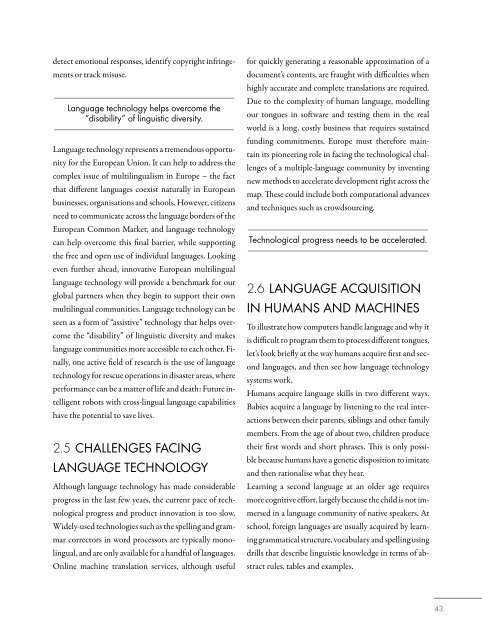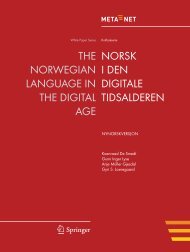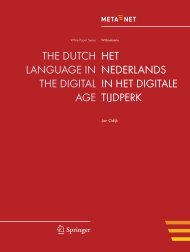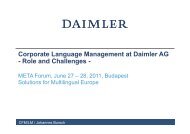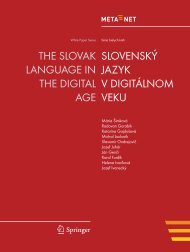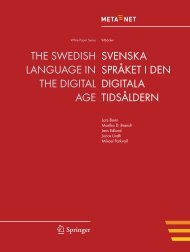Norsk i den digitale tidsalderen - Meta-Net
Norsk i den digitale tidsalderen - Meta-Net
Norsk i den digitale tidsalderen - Meta-Net
You also want an ePaper? Increase the reach of your titles
YUMPU automatically turns print PDFs into web optimized ePapers that Google loves.
detect emotional responses, i<strong>den</strong>tify copyright infringe-<br />
ments or track misuse.<br />
Language technology helps overcome the<br />
“disability” of linguistic diversity.<br />
Language technology represents a tremendous opportu-<br />
nity for the European Union. It can help to address the<br />
complex issue of multilingualism in Europe – the fact<br />
that different languages coexist naturally in European<br />
businesses, organisations and schools. However, citizens<br />
need to communicate across the language borders of the<br />
European Common Market, and language technology<br />
can help overcome this final barrier, while supporting<br />
the free and open use of individual languages. Looking<br />
even further ahead, innovative European multilingual<br />
language technology will provide a benchmark for our<br />
global partners when they begin to support their own<br />
multilingual communities. Language technology can be<br />
seen as a form of “assistive” technology that helps over-<br />
come the “disability” of linguistic diversity and makes<br />
language communities more accessible to each other. Fi-<br />
nally, one active field of research is the use of language<br />
technology for rescue operations in disaster areas, where<br />
performance can be a matter of life and death: Future in-<br />
telligent robots with cross-lingual language capabilities<br />
have the potential to save lives.<br />
2.5 CHALLENGES FACING<br />
LANGUAGE TECHNOLOGY<br />
Although language technology has made considerable<br />
progress in the last few years, the current pace of tech-<br />
nological progress and product innovation is too slow.<br />
Widely-used technologies such as the spelling and gram-<br />
mar correctors in word processors are typically mono-<br />
lingual, and are only available for a handful of languages.<br />
Online machine translation services, although useful<br />
for quickly generating a reasonable approximation of a<br />
document’s contents, are fraught with difficulties when<br />
highly accurate and complete translations are required.<br />
Due to the complexity of human language, modelling<br />
our tongues in soware and testing them in the real<br />
world is a long, costly business that requires sustained<br />
funding commitments. Europe must therefore main-<br />
tain its pioneering role in facing the technological chal-<br />
lenges of a multiple-language community by inventing<br />
new methods to accelerate development right across the<br />
map. ese could include both computational advances<br />
and techniques such as crowdsourcing.<br />
Technological progress needs to be accelerated.<br />
2.6 LANGUAGE ACQUISITION<br />
IN HUMANS AND MACHINES<br />
To illustrate how computers handle language and why it<br />
is difficult to program them to process different tongues,<br />
let’s look briefly at the way humans acquire first and sec-<br />
ond languages, and then see how language technology<br />
systems work.<br />
Humans acquire language skills in two different ways.<br />
Babies acquire a language by listening to the real inter-<br />
actions between their parents, siblings and other family<br />
members. From the age of about two, children produce<br />
their first words and short phrases. is is only possi-<br />
ble because humans have a genetic disposition to imitate<br />
and then rationalise what they hear.<br />
Learning a second language at an older age requires<br />
more cognitive effort, largely because the child is not im-<br />
mersed in a language community of native speakers. At<br />
school, foreign languages are usually acquired by learn-<br />
ing grammatical structure, vocabulary and spelling using<br />
drills that describe linguistic knowledge in terms of ab-<br />
stract rules, tables and examples.<br />
43


